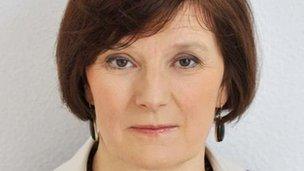Profile: Helen Boaden
- Published

Helen Boaden was a candidate for the director-general post last year before the Savile affair broke
Helen Boaden, former head of BBC News, has been appointed the new BBC Director of Radio.
Her love of broadcasting began with a stint on student radio at the University of Sussex and a job volunteering in New York on the listener-sponsored station WBA1, and led to a course in radio journalism at the London College of Printing.
She finished at the top of the year and joined local radio, moving to the BBC in 1983 as a news producer with Radio Leeds.
A distinguished career in news and current affairs followed.
She became a reporter, and then editor, of BBC Radio 4's flagship weekly current affairs programme, File on 4 - where she won a Sony award for her report on Aids in Africa.
She became known as a regular presenter of Woman's Hour and in 1997, after 18 years with the BBC, she was made head of business programmes.
In March 2000 she was appointed controller of BBC Radio 4 and, two years later, also became controller of BBC 7.
'My lifeblood'
She called Radio 4 "my lifeblood" and outlined her intention to broaden the station's listenership.
"Radio 4 stands for quality, for a state of mind. It's not about class; it's intelligent, open-minded, witty and funny. Listeners will get programmes that feed that state of mind," she said.
During her tenure, audiences breached a record-breaking 10 million during the Iraq war in 2003, and Boaden was credited with giving the sometimes stuffy station a more universal appeal. It won back to back Sony awards for Station of the Year in 2003 and 2004.
Widely viewed as "a safe pair of hands", she also deftly avoided any direct criticism during the Hutton Inquiry.
She took up her role as director of BBC News in September 2004, responsible for flagship programmes like Today, Newsnight, Question Time and Panorama - as well as the BBC News website and the BBC News channel.
With an empire that spans television, radio and online, and included World Service News, 12 English regions and 40 local radio stations, her influence was formidable.
Her remit was broadened in April 2011, when she took on additional responsibility for the Global News division, and joined the BBC's Executive Board.
As the first female director of BBC News, the 56-year-old was touted as a possible candidate for director general when Mark Thompson announced his departure last year.
Many were surprised, and some aggrieved, by the arguably more conventional choice of George Entwistle, announced in September.
Poisoned chalice
But, as allegations of sexual abuse by the one-time BBC star Jimmy Savile broke, some might have felt she had dodged a poisoned chalice.
As news director, Ms Boaden had responsibility for Newsnight and was party to discussions about whether the programme should go ahead - particularly in the light of forthcoming Christmas tribute programme to Savile.
She was also known to have called for "rolling coverage" of Savile's death in October 2011 - a matter of months before the Newsnight investigation was to have aired.
She "stepped aside" in November, pending the outcome of an internal review into the handling of the Savile claims, by former head of Sky News Nick Pollard.
Following the publication of the Pollard Review in December, she was exonerated and returned to her old job.
But the incoming director general, Tony Hall, has decided to move her sideways.
She said: "It is a huge pleasure to be returning to my first love of radio. I look forward to working with our outstanding controllers and some of the most creative on and off air talent in the BBC. The British public love BBC radio and I intend to cherish and champion it."
- Published12 November 2012